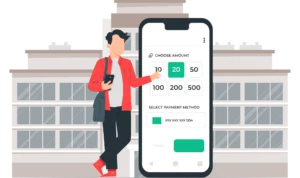Updated: November 12, 2024
Airbnb rental arbitrage has become a popular strategy for those looking to enter the short-term rental market without the high upfront costs of property ownership. At its core, rental arbitrage involves renting a property and then listing it on Airbnb or similar platforms, aiming to generate a profit after covering rent and other expenses.
While it sounds simple, successful rental arbitrage requires careful planning, market research, and an understanding of local regulations. In this article, we’ll explore how Airbnb rental arbitrage works, key considerations for success, and strategies to help you maximize earnings and avoid common pitfalls.
What is Airbnb Rental Arbitrage?
Imagine making a steady income by renting properties on Airbnb without owning any real estate. That’s the concept of Airbnb rental arbitrage—a model where you lease a property long-term and then sublet it short-term on platforms like Airbnb, Vrbo, or Hopper.
The goal? To profit from the difference between your rent costs and the income generated from short-term bookings.
In practice, you rent a property, add appealing touches, and list it for travelers. While the idea sounds straightforward, success in rental arbitrage requires market research and the right tools—vacation rental software can be essential for managing multiple listings, bookings, and pricing.
Think of it like flipping houses but for rentals: if you lease an apartment for $2,000 per month, and book it at $150 per night on Airbnb, two weeks of bookings could cover your rent. The remaining days? That’s where the profit lies, after covering expenses.
What are the Pros and Cons of Airbnb Rental Arbitrage?
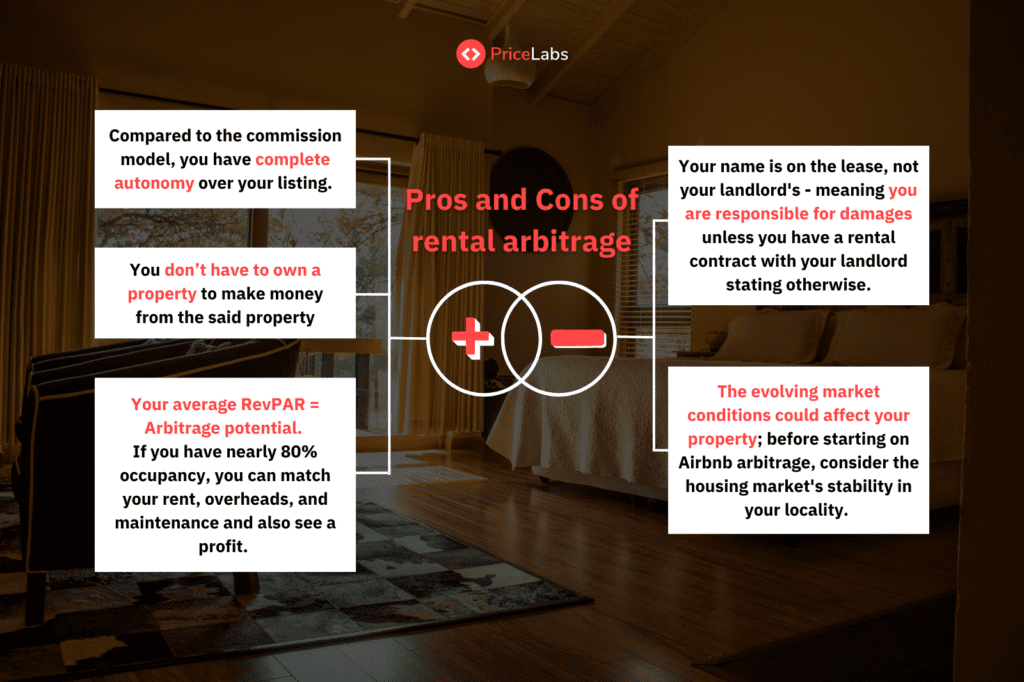

Advantages of Rental Arbitrage
Rental arbitrage offers unique benefits that have helped top Airbnb hosts scale from a single unit to large portfolios with over a hundred properties. Here are some key advantages:
- Minimal Upfront Investment: Without the need for a hefty down payment, you only need the first month’s rent, a security deposit, and essentials like furniture to get started.
- Lower Risk: Since you don’t own the property, major repairs, like a roof replacement, are the landlord’s responsibility. If a property underperforms, you can simply end the lease.
- Scalable Model: Rental arbitrage allows for fast scaling, especially when supported by property management software, enabling you to manage multiple properties across different locations efficiently.
- Simplified Bookkeeping: Unlike property owners, rental arbitrage hosts only need to cover rent and operational costs, avoiding complexities like HOA fees, mortgages, and maintenance.
In short, rental arbitrage lets you start quickly, scale effectively, and minimize risks—ideal for entrepreneurs in the short-term rental market.
Disadvantages of Rental Arbitrage
While rental arbitrage can be profitable, it has its challenges:
- Fixed Rent Obligation: Rent is due every month, regardless of bookings. Failing to pay on time may result in fees, eviction, or even legal action.
- Liability for Property Damage: As the leaseholder, you’re responsible for any damage caused by guests. While Airbnb’s AirCover or insurance may cover some damages, repairs can still be costly.
- Complex Lease Agreements: Clear, detailed rental agreements with landlords are essential to protect everyone involved, often requiring legal support, which can be time-consuming and costly.
- Regulatory and HOA Compliance: Local laws, HOA rules, and even neighborhood restrictions may limit or prohibit short-term rentals, requiring careful research and, in some cases, permissions.
Every business model has its pros and cons; with rental arbitrage, thorough research and careful planning are key to mitigating risks.
How to Calculate Rental ROI of Airbnb Rental Arbitrage?
Calculating the ROI (Return on Investment) for Airbnb rental arbitrage involves comparing your net profit to the total initial and ongoing investment you’ve made.
| Calculate Inital Investment Include the first month’s rent, security deposit, and any expenses for furniture, decor, amenities, and setup costs.Any vacation rental software, management tools, and necessary licenses or permits should also be included. Example: If rent is $2,000, security deposit is $2,000, and setup costs are $3,000, your initial investment is $7,000. | Calculate Monthly Operating Costs Consider: 1. Monthly rent payment 2. Average monthly cost for utilities, internet, etc 3. Recurring costs for cleaning services and minor maintenance 4. Airbnb service fees or Vrbo platform fees, typically a percentage of each booking Example: If rent is $2,000, utilities and internet costs are $200, cleaning is $400, and platform fees are $200, monthly operating costs are $2,800. |
| Calculate Monthly Revenue Consider vacation rental KPIs such as: 1. Occupancy Rate 2. Average Daily Rate (ADR) Example: If ADR = $150, the Occupancy Rate is 80% (24 booked nights); Revenue = 150 x 24 = $3,600 /- | Calculate Net Monthly Profit Net Monthly Profit = Monthly Revenue − Monthly Operating Costs Example: If revenue is $3,600 and costs are $2,800, net profit is $800. |
Annual Net Profit = Monthly Net Profit x 12
ROI Formula:
ROI = {Annual Net Profit / Initial Investment} x 100
For example: If annual profit is $9,600 and initial investment was $7,000, then:
ROI = {9600 / 7000} x 100 = 137 %
A positive ROI indicates profitability, while a higher ROI reflects greater returns.
Adjust ADR, occupancy, and expenses to test potential scenarios and set revenue targets.
How to Start Airbnb Rental Arbitrage?
TikTok, Reddit, Youtube (like the Fearless Investor’s video on Airbnb arbitrage), and other social media networking sites are filled with influencers trying to give you the best way to get started with your first Airbnb arbitrage property. Go ahead and type in ‘Airbnb arbitrage’ anywhere, and you will find people giving their own two cents on this model.
1. Look Into Regulations
The short-term rental market is constantly changing. Local authorities are finding ways to regulate short-term rentals to ensure that the residential housing market is still viable for buyers and long-term renters. You need to talk to local authorities and understand the various regulations in your area.
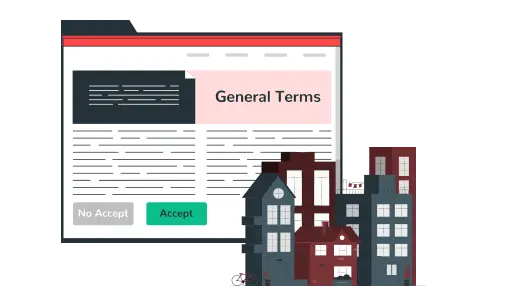

Is it legal? In most cases, yes:
✔ If the property owner allows it
✔ The area where the property is located permits it
Regarding regulations, you’ll have to check with your local government. Some cities have forbidden this type of rental or placed strict limitations on them due to skyrocketing housing prices and reduced real-estate inventory for full-time residents.
You may have to check if you need a hospitality license or are subject to other regulations. In some cities or states, only certain areas can list properties as short-term rentals or properties have to be within specific bedroom category ranges. In other cases, they’re all fully forbidden.
2. Research the Market & Choose the Right Property
Analyze the local market for high-demand areas for short-term rentals. Find properties with strong rental potential, focusing on location, amenities, and competitive rates. The goal is to secure a property that can attract consistent bookings.
PriceLabs Market Dashboards are fully automated personalized dashboards that help you track vacation rental data anywhere in the world. You can analyze various KPIs of your property to make pricing decisions to maximize revenue or make informed investment decisions. It also helps you look better at other markets whenever you expand or create your portfolio.
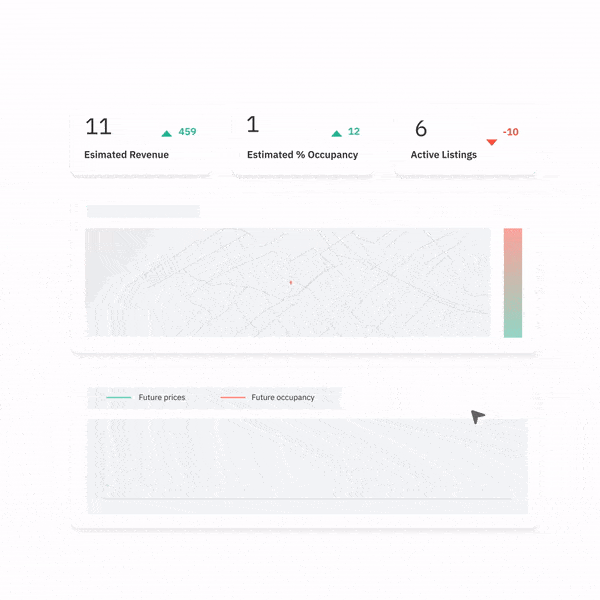

3. Budget & Financial Planning
Conducting a thorough cost analysis is crucial when evaluating a potential property for rental arbitrage. This should include all relevant expenses, such as rent, utilities, furnishings, and any necessary renovations. By detailing both your initial investment and ongoing monthly costs, you can create a realistic budget.
To determine profitability, analyze comparable properties in the area and utilize tools like the PriceLabs Revenue Estimator Pro to assess average daily rates (ADR) and occupancy projections. This will give you a clearer picture of the potential return on investment.
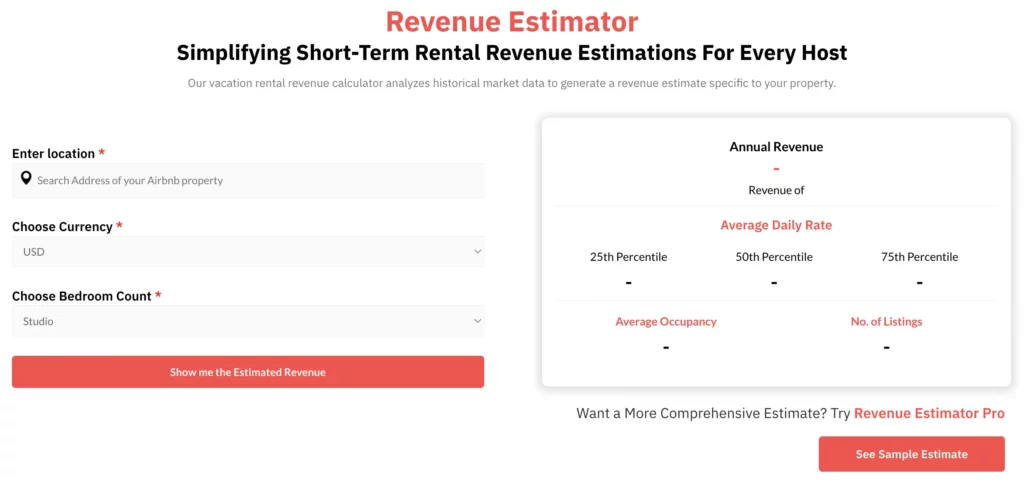

Keep in mind that achieving full occupancy is unlikely, especially in the beginning. It’s wise to project a conservative occupancy rate of around 50% as you start. For instance, if the local ADR is $200 per night, you could earn approximately $3,000 for 15 nights of occupancy in a month. With a monthly rent of $1,000, your net profit would then be $2,000. This method offers a quick way to gauge your potential earnings, even during slower months.
4. Set Up & Furnish the Property
To create an inviting space for guests, focus on transforming the property into a well-designed area that reflects comfort and style.
Start by selecting a cohesive color palette and decor theme that resonates with your target market.
Prioritize essential furnishings such as a comfortable bed, adequate seating, and a functional dining area.
To keep costs manageable, explore budget-friendly options like secondhand stores, thrift shops, or online marketplaces like Facebook Marketplace and Craigslist.
Don’t forget to add thoughtful touches, such as artwork, plants, and quality linens, which can enhance the overall guest experience and make your listing stand out.
5. Build a Strong Listing
Craft a compelling Airbnb listing that draws potential guests in. Use high-quality photos that showcase the property’s best features and capture different angles of each room.
Write engaging descriptions that highlight unique amenities, such as a hot tub, great views, or proximity to local attractions.
Conduct thorough market research to set competitive pricing, and establish clear booking guidelines, including check-in and check-out instructions and any house rules. A well-structured listing not only attracts more bookings but also sets the right expectations for your guests.
6. Manage Operations
Efficient operational management is key to running a successful rental.
Prepare for guest inquiries, bookings, and property maintenance by implementing robust systems.
Property management software can streamline tasks like scheduling cleanings, managing bookings, and communicating with guests.
Stay proactive in addressing guest needs and concerns to ensure a positive experience, encouraging repeat bookings and favorable reviews.
7. Use Dynamic Pricing
Leverage dynamic pricing tools to adjust rates based on seasonal demand, local events, and occupancy rates, helping you stay competitive and maximize revenue.
PriceLabs is a cutting-edge dynamic pricing tool specifically designed for the vacation rental industry, empowering property owners and managers to optimize their pricing strategies for maximum revenue and occupancy rates. With the vacation rental market booming, leveraging technology like PriceLabs can be a game-changer.
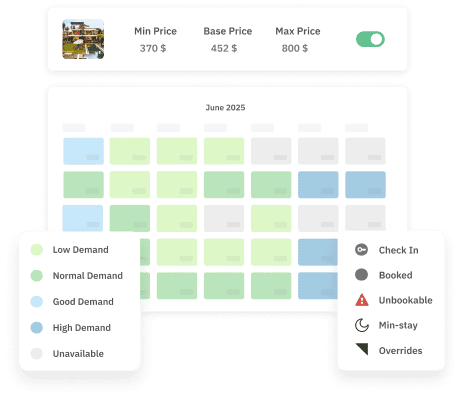

Key Features of PriceLabs:
- Automated Pricing: PriceLabs intelligently adjusts rental prices based on market demand, seasonal trends, competitor pricing, and local events. This ensures that your rates are always competitive and aligned with current market conditions.
- Customization: Users can create personalized pricing rules tailored to their unique needs. This includes defining minimum and maximum rates, length-of-stay requirements, and other specific criteria to fit their business model.
- Competitive Analysis: Stay ahead of the competition with detailed market insights that inform your pricing decisions. PriceLabs provides valuable data to help you understand how your property stacks up against others in your area.
- Demand Forecasting: Utilizing sophisticated algorithms and historical data, PriceLabs predicts future demand and adjusts prices proactively. This feature helps in maximizing occupancy during peak seasons while minimizing vacancies during slower periods.
- Calendar Integration: Seamlessly syncs with popular platforms such as Airbnb, VRBO, and Booking.com.
- Reports and Analytics: Generate detailed reports that provide insights into the effectiveness of your pricing strategies over time. This data-driven approach enables you to refine their tactics continuously.
- Integration with 90+ PMS: Effortlessly import your listings into PriceLabs for a streamlined setup process.
PriceLabs simplifies the dynamic pricing process for vacation rentals by analyzing a multitude of factors that influence rental rates. The Base Price Help tool estimates an initial base price upon importing listings, using both property attributes and performance data. Setting an appropriate base price is crucial; the algorithm then suggests prices based on this foundational figure.
Users can further customize their pricing with date-specific overrides while ensuring compliance with user-defined minimum and maximum limits. This flexibility allows for informed decision-making tailored to each listing’s unique characteristics.
What are the Alternatives to Airbnb Rental Arbitrage?
If you’re exploring alternatives to rental arbitrage, several options in the short-term rental market can provide similar benefits without the complexities of leasing and subletting. Here are some viable alternatives:
- Property Management Services
You can offer property management services for homeowners wanting to rent on platforms like Airbnb or VRBO. You earn a percentage of the rental income while handling guest communication, cleaning, and maintenance. The property owner with ownership and responsibility. - Co-Hosting
Partner with property owners as a co-host, assisting with guest check-ins, cleaning, and marketing. You earn a fee or a percentage of the rental income without the financial risks of leasing a property. - Short-Term Rental Investments
Consider purchasing properties specifically for short-term rentals. This approach requires more capital but allows for greater control over operations and potential long-term appreciation. - Corporate Housing
Lease fully furnished properties for business travelers seeking temporary accommodations. This market often yields longer stays than typical vacation rentals, leading to more stable income. - Buy-and-Hold Strategy
This common real estate investment strategy focuses on long-term wealth growth through property appreciation, debt paydown, and tax deductions. Owning real estate grants you greater control and security against eviction. - Commission Model
Partner with homeowners to split revenues or profits. This model allows homeowners to list their property on OTAs while using it occasionally, with little risk for you. You benefit from immediate cash flow and retain control of the listing. If the homeowner decides to terminate the partnership, they lose the online presence you established.
These alternatives offer unique advantages, allowing you to select a path that aligns with your financial goals.
Conclusion: Is Airbnb Rental Arbitrage For You?
While rental arbitrage can be lucrative. It’s not as simple as just listing a property and waiting for the money to roll in. You need to research the local demand for short-term rentals, know the ins and outs of local laws, and be comfortable with a hands-on business that requires strong customer service and organizational skills.
Done right, rental arbitrage can provide a flexible way to build an income stream without owning property. This model gives you the freedom to explore real estate without the financial barriers to ownership. Just be ready to put in the legwork!
Simplify Getting Into Airbnb Rental Arbitrage With PriceLabs
With people preferring exclusivity and personalized stays, there is significant potential to earn from a vacation rental home. However, managing the property and revenues together can seem like a hassle. Not anymore if you choose PriceLabs.
PriceLabs is a revenue management solution for the short-term rental and hospitality industry, founded in 2014 and headquartered in Chicago, IL. Our platform helps individual hosts and hospitality professionals optimize their pricing and revenue management, adapting to changing market trends and occupancy levels.
With dynamic pricing, automation rules, and customizations, we manage pricing and minimum-stay restrictions for any portfolio size, with prices automatically uploaded to preferred channels such as Airbnb, Vrbo, and 110+ property management and channel integrations.
Every day, we price over 400,000+ listings globally across 135+ countries, offering world-class tools like the Base Price Help and Minimum Stay Recommendation Engine. Choose PriceLabs to increase revenue and streamline pricing and revenue management. Sign up for a free trial at pricelabs.co today.



